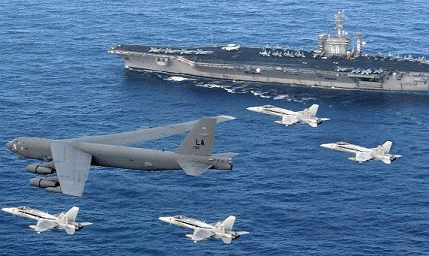From Strategic Culture
The war of words between China and the US flared again this week with warnings from Beijing that any move by Washington to implement a naval blockade in the South China Sea would trigger an armed conflict.
However, these tensions with China are just one of several global flashpoints that are testing the declared America First policy of President Donald Trump.
America First sounds like a laudable aspiration. But it would be naive to think that the US can simply reorient inwards and behave like a good global neighbor. Its economic power interests are dependent on foreign dominance, which in turn implies conflict and war with other nations. This is the harsh reality of US-led capitalism, regardless of what kind of president occupies the White House.
Trump campaigned on a platform of scaling back US military overseas interventions. In his inaugural speech on January 20, he again emphasized his America First pledge, whereby the focus of his presidency would be a nationalist-driven building of US economy and society. The overseas military adventurism of his predecessors, Barack Obama and George W Bush, and others before them, would be jettisoned in order to prioritize American interests at home.
Trump declared at his swearing-in on Capitol Hill that the US would seek friendship and goodwill with the nations of the world and not seek to impose our way of life on anyone, but let it shine as an example for others to follow . The days of foreign militarism were over, he said, so that American infrastructure would not fall into disrepair and decay.
Nonetheless, within days of making those grand utterances, the Trump administration looks very much like any other predecessor in terms of willingness to continue getting embroiled in foreign conflicts.
Tensions with China this week featured prominently in the headlines. Is Trump ready for war in the South China Sea? asked the Washington Post. This followed a statement from the White House saying that it was prepared to block China's access to reclaimed islands in the disputed strategic sea. Such a naval blockade by the US would constitute an act of war. It goes way beyond what the Obama administration ever gambled on in its wrangling with China over the contested territory.
The provocative brinkmanship by the Trump administration over the South China Sea is, disturbingly, only the latest in a series of perceived insults to Beijing. Trump has repeated accusations against China of unfair trading practices, threatening to impose punitive tariffs on Chinese exports, and he has scoffed at Washington's long-held One China Policy, casting aspersions on Beijing's historical claims over Taiwan.
The gravity of the US-China standoff was underscored by news reports that Chinese intercontinental ballistic missiles have been newly stationed in the country's northeast region, which are capable of targeting the US mainland. The move is bound to be seen as a response by Beijing to the Trump administration's bellicose rhetoric.
If this were not perplexing enough, China is only one of several other global flashpoints that the Trump presidency seems to be playing with fire. North Korea, Iran, Venezuela and the ongoing escalation of NATO forces on Russia's western borders are other major risks.
North Korea's leader Kim Jung Un earlier this month vowed that his country would continue developing ICBM technology to eventually reach the capability of striking the US. (Hundreds of American nuclear missiles are already capable of striking North Korea, but this asymmetry is somehow deemed acceptable.) In typical cryptic language, Trump hit back at Kim Jung Un through a twitter soundbite, saying: It's not going to happen! That curt message could be construed as meaning a pre-emptive American attack on the already isolated and heavily sanctioned Korean nation. Such veiled American threats will only incite further militarism.
If Trump were serious about taking care of domestic American business and society as a priority, he should be negotiating a draw-down of tens of thousands of US forces which have been on the Korean Peninsula for six decades since the Korean War ended in 1953. Not only troops, but also American warplanes, warships, missiles and punitive sanctions. Trump should be reviving multilateral regional talks with Pyongyang to establish a process of normalizing diplomatic relations. Instead Trump is continuing a failed and ticking time-bomb policy of militarism towards Pyongyang.
On Iran, Trump has again poured oil on troubled waters, rather than pursuing peaceful diplomacy. He has threatened to tear up the international nuclear accord, calling it the worst deal ever. This week, Iran said that the US was failing to implement the Joint Comprehensive Plan of Action negotiated last year between Tehran and six other parties, including Russia, China and the European Union. Iranian vexation is understandable considering that US obstructionism to the deal's implementation is costing Iran billions of dollars in lost trade opportunities.
Trump's appointment of General James "Mad Dog" Mattis as Defense Secretary bodes for a much more hostile stance towards Iran. While serving in Iraq as a Marine commander, Mattis was known for hawkish views on Iran over the latter's alleged support for Iraqi insurgents. The new Pentagon chief also wants to hit back with force over ongoing tensions in the Persian Gulf between Iranian and American navy vessels. An explosive incident could happen any day and Trump's hot heads are itching to escalate.
(Note: You can view every article as one long page if you sign up as an Advocate Member, or higher).






